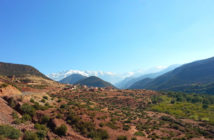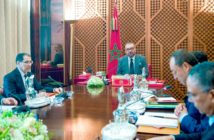A $300 million loan, underpinned by a comprehensive program to build local institutional capacity, will support the second phase of Morocco’s National Initiative for Human Development (INDH). A $50 million loan will facilitate access to finance for micro, small and medium enterprises (MSMEs).
“INDH is the centerpiece of the government’s commitment to address social and economic exclusion in underserved areas,” said Inger Andersen, World Bank Vice President for the Middle East and North Africa Region. “By supporting the second phase of this innovative program we stand proudly with the government in its drive towards greater results.”
INDH2 finances income-generating activities, improved access to basic services and key infrastructure in the poorest regions of Morocco. Taking lessons from INDH1, launched in 2005, the government nearly doubled the geographic scope and increased the budget from $1.7 billion to $2.1 billion for phase 2. But it also raised the bar delivering tangible benefits. INDH2 is the first World Bank-supported project using the “Program for Results” (PforR), a new lending instrument which disburses funds based on the achievement of agreed and verified results.
“This is a whole new discipline in the development community’s efforts to make sure that development dollars deliver on their promises,” said Simon Gray, World Bank Director for the Maghreb Department. “It’s a bold commitment by the government to ensure that communities benefit in ways that sustainably change their quality of life and access to economic opportunities.”
Among the results linked to Bank financing are better educational achievements by rural girls, a higher share of the rural population with access to water supply, an increase in the number of sustainable income-generating activities, and a higher share of women and youth in INDH local governance bodies. The soundness of local-level procurement procedures is also measured.
“In effect, the Government of Morocco has said ‘here is our raised bar, help us reach it and help us build the capacity at the local level that will ensure these efforts live on and expand for all Moroccans’,” said Franck Bousquet, World Bank Sector Manager for Social Development in MENA. “This is a farsighted commitment to excellence and rigor.”
INDH2 builds on the capacity created during INDH1, but introduces complementary measures to improve local-level management capacity.
“The PforR will be a stimulus for increasing the socio-economic inclusion of vulnerable groups,” said Mohamed Medouar, World Bank INDH Project Leader. “The focus on verifiable results is very much in line with the commitment to more open and transparent governance.”
The US$50 million Micro, Small, and Medium Enterprise Development Project enhances access to finance for Moroccan businesses. According to the World Bank, the project, developed with the International Finance Corporation, will support the provision of partial credit guarantees for loans to MSMEs.
“Well-designed partial credit guarantee schemes can be effective in reaching underserved groups such as start-ups, small firms and women entrepreneurs,” said Teymour Abdel Aziz, World Bank Morocco MSME project team leader for the project. “The project targets entrepreneurs who remain underserved by the Moroccan financial system.”
.






